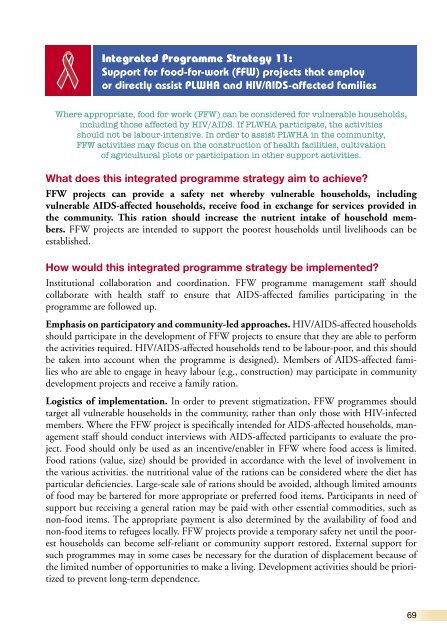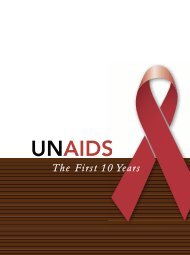Integration of HIV/AIDS activities with food and nutrition support in ...
Integration of HIV/AIDS activities with food and nutrition support in ...
Integration of HIV/AIDS activities with food and nutrition support in ...
You also want an ePaper? Increase the reach of your titles
YUMPU automatically turns print PDFs into web optimized ePapers that Google loves.
Integrated Programme Strategy 11:<br />
Support for <strong>food</strong>-for-work (FFW) projects that employ<br />
or directly assist PLWHA <strong>and</strong> <strong>HIV</strong>/<strong>AIDS</strong>-affected families<br />
Where appropriate, <strong>food</strong> for work (FFW) can be considered for vulnerable households,<br />
<strong>in</strong>clud<strong>in</strong>g those affected by <strong>HIV</strong>/<strong>AIDS</strong>. If PLWHA participate, the <strong>activities</strong><br />
should not be labour-<strong>in</strong>tensive. In order to assist PLWHA <strong>in</strong> the community,<br />
FFW <strong>activities</strong> may focus on the construction <strong>of</strong> health facilities, cultivation<br />
<strong>of</strong> agricultural plots or participation <strong>in</strong> other <strong>support</strong> <strong>activities</strong>.<br />
What does this <strong>in</strong>tegrated programme strategy aim to achieve?<br />
FFW projects can provide a safety net whereby vulnerable households, <strong>in</strong>clud<strong>in</strong>g<br />
vulnerable <strong>AIDS</strong>-affected households, receive <strong>food</strong> <strong>in</strong> exchange for services provided <strong>in</strong><br />
the community. This ration should <strong>in</strong>crease the nutrient <strong>in</strong>take <strong>of</strong> household members.<br />
FFW projects are <strong>in</strong>tended to <strong>support</strong> the poorest households until livelihoods can be<br />
established.<br />
How would this <strong>in</strong>tegrated programme strategy be implemented?<br />
Institutional collaboration <strong>and</strong> coord<strong>in</strong>ation. FFW programme management staff should<br />
collaborate <strong>with</strong> health staff to ensure that <strong>AIDS</strong>-affected families participat<strong>in</strong>g <strong>in</strong> the<br />
programme are followed up.<br />
Emphasis on participatory <strong>and</strong> community-led approaches. <strong>HIV</strong>/<strong>AIDS</strong>-affected households<br />
should participate <strong>in</strong> the development <strong>of</strong> FFW projects to ensure that they are able to perform<br />
the <strong>activities</strong> required. <strong>HIV</strong>/<strong>AIDS</strong>-affected households tend to be labour-poor, <strong>and</strong> this should<br />
be taken <strong>in</strong>to account when the programme is designed). Members <strong>of</strong> <strong>AIDS</strong>-affected families<br />
who are able to engage <strong>in</strong> heavy labour (e.g., construction) may participate <strong>in</strong> community<br />
development projects <strong>and</strong> receive a family ration.<br />
Logistics <strong>of</strong> implementation. In order to prevent stigmatization, FFW programmes should<br />
target all vulnerable households <strong>in</strong> the community, rather than only those <strong>with</strong> <strong>HIV</strong>-<strong>in</strong>fected<br />
members. Where the FFW project is specifically <strong>in</strong>tended for <strong>AIDS</strong>-affected households, management<br />
staff should conduct <strong>in</strong>terviews <strong>with</strong> <strong>AIDS</strong>-affected participants to evaluate the project.<br />
Food should only be used as an <strong>in</strong>centive/enabler <strong>in</strong> FFW where <strong>food</strong> access is limited.<br />
Food rations (value, size) should be provided <strong>in</strong> accordance <strong>with</strong> the level <strong>of</strong> <strong>in</strong>volvement <strong>in</strong><br />
the various <strong>activities</strong>. the <strong>nutrition</strong>al value <strong>of</strong> the rations can be considered where the diet has<br />
particular deficiencies. Large-scale sale <strong>of</strong> rations should be avoided, although limited amounts<br />
<strong>of</strong> <strong>food</strong> may be bartered for more appropriate or preferred <strong>food</strong> items. Participants <strong>in</strong> need <strong>of</strong><br />
<strong>support</strong> but receiv<strong>in</strong>g a general ration may be paid <strong>with</strong> other essential commodities, such as<br />
non-<strong>food</strong> items. The appropriate payment is also determ<strong>in</strong>ed by the availability <strong>of</strong> <strong>food</strong> <strong>and</strong><br />
non-<strong>food</strong> items to refugees locally. FFW projects provide a temporary safety net until the poorest<br />
households can become self-reliant or community <strong>support</strong> restored. External <strong>support</strong> for<br />
such programmes may <strong>in</strong> some cases be necessary for the duration <strong>of</strong> displacement because <strong>of</strong><br />
the limited number <strong>of</strong> opportunities to make a liv<strong>in</strong>g. Development <strong>activities</strong> should be prioritized<br />
to prevent long-term dependence.<br />
69

















